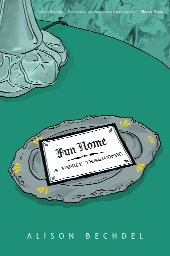Alison Bechdel’s portrait of her father in “Fun Home”
“It’s about growing up with my closeted gay dad who died right after I came out to my family when I was in college,” Bechdel said of the graphic novel, which she has worked on since 1998. “His death was very likely suicide, but no one knows for sure. The book is an attempt to sort out that very confusing period of my life. It’s also a portrait of my father, who was a pretty interesting character. One of his many jobs was running the family funeral home—that’s where the title ‘Fun Home’ comes from.”
In the book, Bechdel investigates her relationship with her father and her art, and discovers she has realized his dreams, despite her attempts to rebel against them.
“My dad had always wanted me to be an artist, but not in a good way—in an overbearing, vicarious, annihilating way, so of course I resisted him as much as I could,” said Bechdel. “I found a means of creative expression—cartooning—for which he had no reference point, no criteria. And for years after he died I would disavow my own artistic drive. My comic strip was journalism, or illustration, I’d tell myself. It was a useful, populist endeavor, not the kind of rarefied, art-for-art’s sake crap that my dad idolized.”
But writing “Fun Home” was different than penning a weekly column, no matter how successful. Bechdel could no longer ignore the differences between the fictional world of “Dykes to Watch Out For” and her own reality as seen in “Fun Home.”
Bechdel said “Fun Home” differed from “Dykes to Watch Out For” in several ways—it is a true story, which constrained her more to the truth, but unlike the weekly DTWOF strip, Bechdel had much more time and space to spend on the work.
“My comic strip is an extremely rigid little form—I have ten or twelve panels in which to tell a short but complete story every other week,” said Bechdel. “In ‘Fun Home’ I could stretch out and lavish much more attention on the drawings, rather than just cramming them in around the words like I have to do in my strip.”
Still, the words didn’t always come easily, said Bechdel. “When I first started working on ‘Fun Home,’ I had no confidence in what I was doing,” admitted Bechdel. “I didn’t consider myself a writer. I doubted my perceptions. And for every three words I managed to write down, I’d undo two. It was very slow going.”
Bechdel said it was like her dad was stuck in her head, “editing the bejeezus out of everything I tried to do. But I stayed focused on what I was doing and eventually my own voice got louder than his, and the building began to outstrip the dismantling.”
When she was almost done with the book, Bechdel realized that “what it was really about was not my dad’s suicide, or our shared homosexuality, but the story of my artistic apprenticeship to my father. It’s about becoming an artist because of him and in spite of him.”
In this way “Fun Home” became her catharsis for growth, both a means and an end. Bechdel said, “I couldn’t have written the book unless I underwent some fairly profound change, but the way I effected that change was through the process of writing the book.”
gaycitynews.com




































